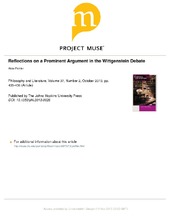| dc.contributor.author | Pichler, Alois | eng |
| dc.date.accessioned | 2014-02-05T12:51:34Z | |
| dc.date.available | 2014-02-05T12:51:34Z | |
| dc.date.issued | 2013-10 | eng |
| dc.Published | Philosophy and Literature 37(2): 435-450 | eng |
| dc.identifier.issn | 0190-0013 | |
| dc.identifier.other | http://muse.jhu.edu/journals/philosophy_and_literature/v037/37.2.pichler.html | eng |
| dc.identifier.uri | https://hdl.handle.net/1956/7762 | |
| dc.description.abstract | Does the way authors treat their own works tell us something about how these works are to be understood? Not necessarily. But then a standard argument against the “New Wittgenstein” comes under question. The argument is: the undogmatic interpretation of Wittgenstein’s Tractatus cannot be correct, since Wittgenstein himself later treats it as a work that holds certain positions. My response is: the argument is only correct if the answer to four specific questions is “yes.” The main purpose of the paper is to bring issues of philosophical authorship more into focus within Wittgensteinian interpretation. | en_US |
| dc.language.iso | eng | eng |
| dc.publisher | The Johns Hopkins University Press | eng |
| dc.subject | Wittgenstein | eng |
| dc.subject | Authorship | eng |
| dc.subject | Philosophy | eng |
| dc.subject | Argument | eng |
| dc.subject | Criticism | eng |
| dc.title | Reflections on a Prominent Argument in the Wittgenstein Debate | eng |
| dc.type | Peer reviewed | |
| dc.type | Journal article | |
| dc.description.version | publishedVersion | |
| dc.rights.holder | Copyright 2013 The Johns Hopkins University Press | |
| dc.identifier.cristin | 1066864 | |
| dc.source.journal | Philosophy and Literature | |
| dc.source.40 | 37 | |
| dc.source.14 | 2 | |
| dc.source.pagenumber | 435-450 | |
